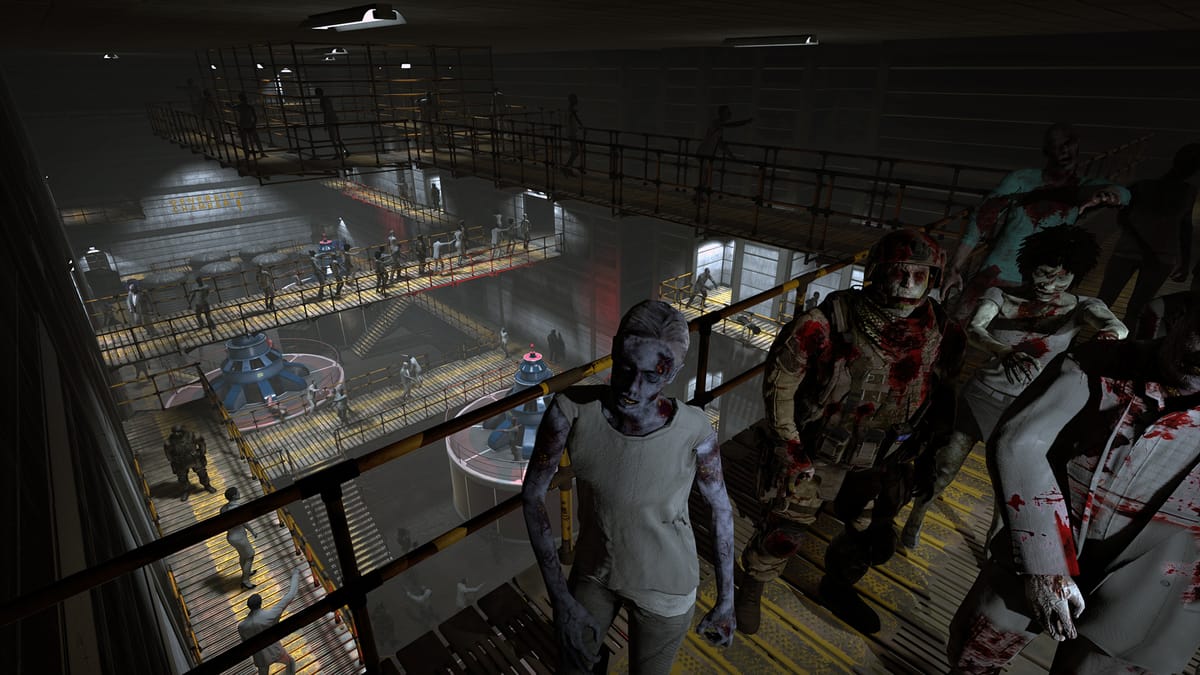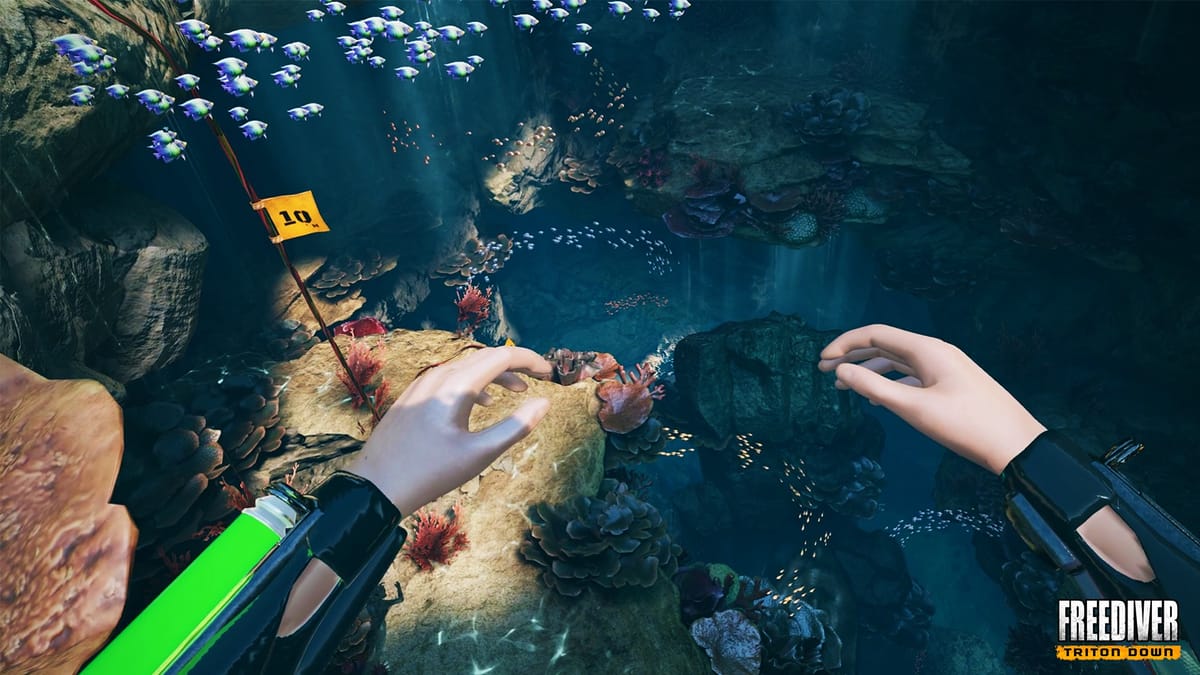I thought it would make sense to have a central thread about all things VR -- I don't expect it to have sufficient posting frequency for it to make sense to split it into e.g. separate HW/SW or platform threads. And I'm a huge VR nerd so that's why I'm making it 
So what is VR?
Current consumer VR works by rendering 3D scenes in 2 perspectives (one for each eye) and showing them in a head-mounted display (HMD). One thing that made the whole idea feasible in relatively cheap hardware is correcting for much of the distortion inherent in the required optics in software -- that is, showing a distorted image on the screen(s) which then looks correct to the user through the optics.
VR input is a really interesting piece of the puzzle, especially for gaming. Outside of specific simulators (e.g. racing, flight, etc.) most people agree these days that fully tracked VR input is what you want. This generally means you have 2 controllers which are tracked in space (and allow various additional functions depending on their sophistication).
Who are the players?
There are several relevant VR platforms right now, in 4 major categories: PC VR, console VR, standalone VR, and phone VR. Of those, I'm obviously most interested in the first one, but I'll also provide a quick overview of console VR. I don't know much about phone VR and I also don't think it's that interesting from a ("core") gaming perspective, so I'll skip that. The standalone VR space is still in the process of getting really interesting, so I'll write more about that later.
PC VR
On PC, as always, we need to distinguish between software and hardware platforms.
The software platforms are, in order of relevance:
Console VR
The big player in the console space is Sony with the PSVR kit. It is somewhat limited by middling tracking performance (and of course the underlying hardware), but it's also more accessible than PC VR and has a few interesting exclusives. The HMD uses a single OLED panel.
Nintendo of course has the Labo VR kit, which is more of a curiosity than a real VR platform (I can already hear the angry replies ).
).
Microsoft initially hinted at XB1(X) comaptibility with WMR, but they seem to have scrapped those plans, or at least delayed them indefinitely.
What's hot right now?
I'd say the most significant upcoming events are:
All of this is just a very general summary, if you have more questions then go ahead. Or post about VR games, experiences, hardware I missed, or whatever else as long as it's VR

So what is VR?
Current consumer VR works by rendering 3D scenes in 2 perspectives (one for each eye) and showing them in a head-mounted display (HMD). One thing that made the whole idea feasible in relatively cheap hardware is correcting for much of the distortion inherent in the required optics in software -- that is, showing a distorted image on the screen(s) which then looks correct to the user through the optics.
VR input is a really interesting piece of the puzzle, especially for gaming. Outside of specific simulators (e.g. racing, flight, etc.) most people agree these days that fully tracked VR input is what you want. This generally means you have 2 controllers which are tracked in space (and allow various additional functions depending on their sophistication).
Who are the players?
There are several relevant VR platforms right now, in 4 major categories: PC VR, console VR, standalone VR, and phone VR. Of those, I'm obviously most interested in the first one, but I'll also provide a quick overview of console VR. I don't know much about phone VR and I also don't think it's that interesting from a ("core") gaming perspective, so I'll skip that. The standalone VR space is still in the process of getting really interesting, so I'll write more about that later.
PC VR
On PC, as always, we need to distinguish between software and hardware platforms.
The software platforms are, in order of relevance:
- SteamVR / OpenVR, the largest platform in terms of number of titles and hardware supported. Pretty much every PC VR HMD works with SteamVR.
- The Oculus PC store, which is relevant primarily due to the exclusives funded by Oculus. Officially restricted to Oculus hardware, but can be used with most OpenVR hardware using the third-party ReVive layer.
- Windows Mixed Reality, which is currently pretty much meaningless as a (gaming) software platform.
- HTC's Viveport, and probably other's I'm missing, which are also practically irrelevant.
- The HTC Vive and Vive Pro. These were designed in cooperation with Valve and are the "native" SteamVR systems currently. The Pro is much more expensive and uses somewhat higher resolution displays. Both have the largest possible FoV in the consumer space right now, outside Pimax.
Tracking works using 2 "lighthouses" which only need a power connection and allow for good tracking quality in a relatively large space. - The Oculus Rift (CV1). Similar in terms of HMD to the Vive, but with somewhat lower FoV (and therefore somewhat higher perceived resolution). Tracking uses external cameras, which need to connect to your PC, and you need 3 of them to get good 360° room-scale coverage.
- Various Windows Mixed Reality HMDs. These are available from OEMs like Lenovo, Acer or HP. They use LCD panels instead of the OLED panels used in Vive and Rift, with slightly higher resolution but lower contrast. Tracking uses HMD-mounted cameras, which has the advantage of no setup but the disadvantage of losing trackign outside the camera field of view.
- The Samsung Odyssey and Odyssey+. Also a WMR headset with the same tracking, but uses OLED panels and slightly higher quality controllers.
- The Pimax 5k+, 8k and XR. These are wide-field-of-view HMDs by a small Chinese company. They use lighthouse tracking and don't come with any controllers right now, so they are mostly an enthusiast upgrade path from Vive setups.
Console VR
The big player in the console space is Sony with the PSVR kit. It is somewhat limited by middling tracking performance (and of course the underlying hardware), but it's also more accessible than PC VR and has a few interesting exclusives. The HMD uses a single OLED panel.
Nintendo of course has the Labo VR kit, which is more of a curiosity than a real VR platform (I can already hear the angry replies
 ).
).Microsoft initially hinted at XB1(X) comaptibility with WMR, but they seem to have scrapped those plans, or at least delayed them indefinitely.
What's hot right now?
I'd say the most significant upcoming events are:
- Valve releasing the specs of their VR solution (including a HMD and extremely amazing controllers) on May 1st.
This is the biggest hardware effort ever from Valve, easily, and extremely exciting. Expectations range anywhere from a solid but unspectacular high-end VR system to revolutionary cyberpunk technology, and similarly pricing speculation ranges from $500 to $1000+ for the whole kit.
I'm hyped. - Oculus releasing the Quest in "Spring 2019".
This is easily the most advanced and well-supported standalone VR system so far, and might be a way to get a lot more people to experience "high-ish" end VR.
All of this is just a very general summary, if you have more questions then go ahead. Or post about VR games, experiences, hardware I missed, or whatever else as long as it's VR















